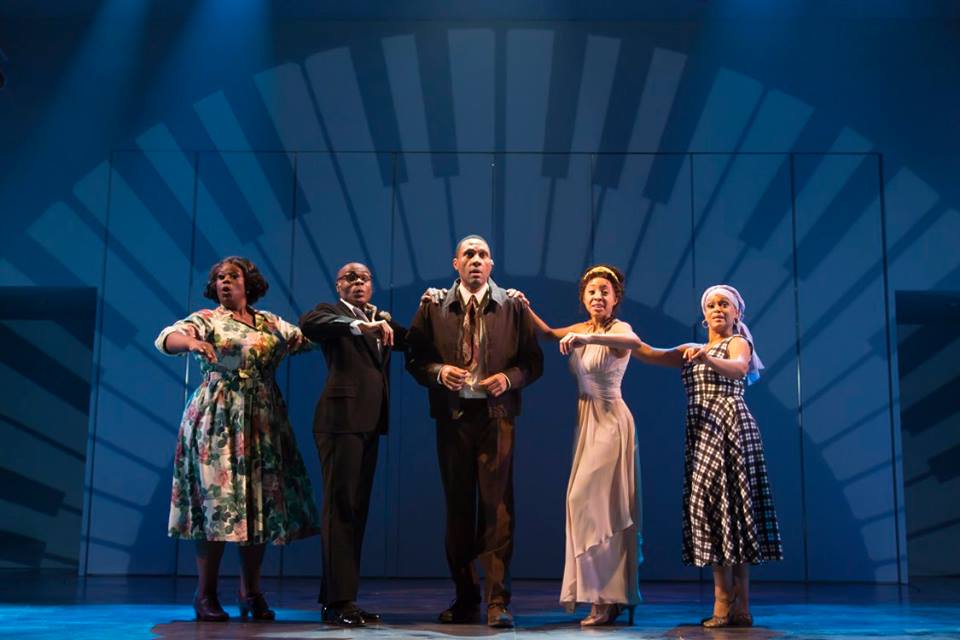
Photo: T. Charles Erickson. — at Huntington Theatre Company.
Presented by the Huntington Stage Co.
by George C. Wolfe
Directed/choreographed by Billy Porter
Music direction and arrangement by James Sampliner
March 6 – April 5, 2015
Avenue of the Arts
Boston, MA
Huntington on Facebook
Review by Kitty Drexel
The Colored Museum is two hours short and presented without an intermission.
(Boston, MA) The majority of Black culture accessible to White people is appropriated into easily digestible, tepid hunks that wouldn’t scare a baby much less a conservative one percenter who thinks that an Azealia Banks is a deciduous shrub. The Colored Museum is like a trip on Disney’s It’s A Small World if the ride were devoted to the culture pacifying White people instead of world peace. It’s a powerful display of stereotype and the bleak truths that cement them into western society. Those with an understanding of race relations and the systematic control racism has on these relations will likely enjoy the romp. Those who think discussing race with their Starbucks barista is equal to having a race relation will have their mind blown.
There is no strict plot in Colored Museum. It begins in the cabin of a passenger plane and ends at a party where everyone is crying because they want to. There is song, dance and a modicum of flow poetry. Each scene is presented to the audience as a monologue/dialogue offering insight into the cultural aspects the characters represent. Slavery is immediately broached to remind the viewer of the roots of modern Black culture, and to indicate where the show is going. Other staples such as food, rage, (adult) personhood and authenticity of integrity are also given due diligence. It was like attending a crash course in African-American studies as presented by ABC Family (and ghost written by Malcom X).
This production is intended to be humorous and it is. It is funny because the subject matter is so severe. For centuries, POCs have had to ask White people for permission to be themselves. George C. Wolfe has taken an extra step in this tradition by unabashedly presenting this plea through song and dance. If watching this production doesn’t make you uncomfortable then you aren’t thinking hard enough. Just because Kanye West says racism is a dated concept, that doesn’t make it any less culturally insidious. Humor is one way to fight back. Wolfe, Porter, and the cast at the Huntington are doing just that.
The cast at the Huntington does an excellent job of making us uncomfortable while inspiring deeper thought. The entire ensemble whips the audience into a frenzy with their truthful one-liners and pithy anecdotes. It was a particular pleasure to watch Nathan Lee Graham as Miss Roj take on NYC queer culture. He gave depth to his aging snap queen. Her desperation was as beautiful as it was tragic.
In general, this production has great pacing. There’s some vulnerable moments from a Vietnam Vet (Ken Robinson) describing his death, a sweet monologue from a pregnant teen (Shayna Small), and a grieving Mama (Capathia Jenkins). Different scenes vary in tempo and have a steady ebb and flow. Or, they do until the scene introducing R&B goddess LaLa (Rema Webb). LaLa and her intense monologue pummels the audience with stressful amounts of drama from the moment she gets onstage. Webb has the voice of a wicked angel but the delivery of a bull in a china shop.
Many technical elements come together seamlessly to deliver the audience to the Museum. The costumes by Anita Yavich exquisitely convey passage of time as well as cultural identity. The scenic design by Clint Ramos is stunning as it is aggressive. The music by Kysia Bostic ties each scene to the next and gives life to the play’s set changes.
I’m going to go out on a limb and assume that others will call this production “provocative.” It is, but not for the reasons one might think. One day POCs will not have to prepackage themselves as harmless so White people aren’t afraid to engage Black them. One day we’ll be able to trust the experiences of POCs without questioning them first. That day is not today and for this reason productions like The Colored Museum are absolutely necessary. Go, see this production. Do it to support race equity in Boston, to learn, and because it is some amazing theatre.
